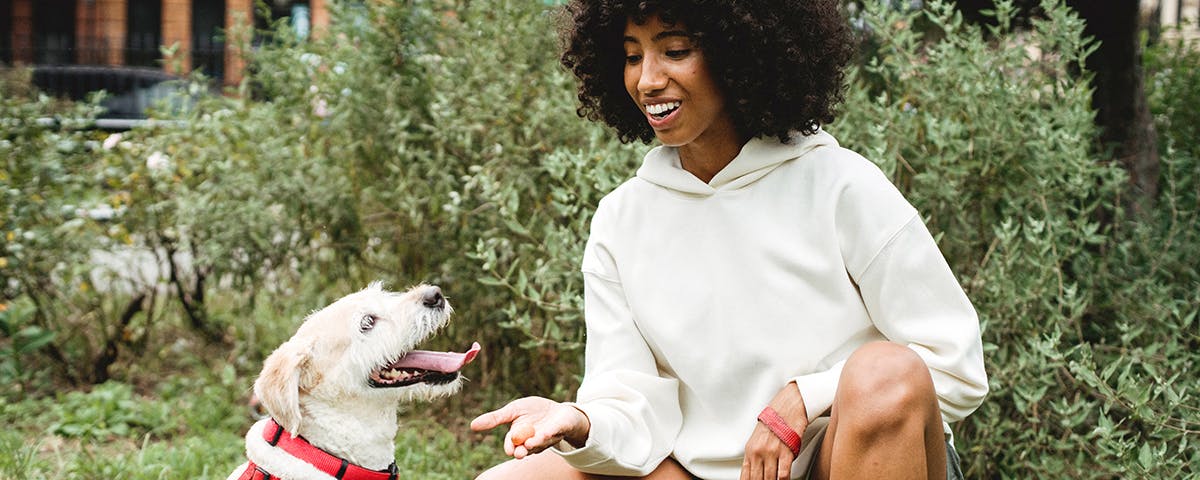You've brought your new puppy home, and although they're settling in well they still have a lot to learn. Doing this as a family can be fun, and one of the best ways to teach your puppy the ropes is by taking them to school – that is, dog training classes. These teach the basics of obedience: such as coming when called, walking on a loose lead and greeting people properly (not jumping up). The earlier in your dog's life you book, the quicker you can start creating good habits.
Searching "dog training near me" is a great place to start, but with so many options out there it's important to understand how to narrow them down to find the right type of training for your dog. After all, each dog is an individual and will have their own way of learning – just like humans.
Trending posts
Purr-use some of the top blogs our members have been loving this month- Top male dog names for your new furry friendGot a new furry family member in your pack? Check…

- Top female dog names for your new fluffy palWelcoming a new pooch into your family? Explore…

- 250+ gray cat names your silver feline will loveRecently welcomed a fluffy gray bundle of joy into…

- What are normal pet sitting rates?Discover the average pet sitting rates for animals…

- Unique dog names to stand out from the packDare to be different with our list of the best…

Why train your puppy?
Puppy training is about more than "sit", "stay" and "roll over" – although we do love seeing dogs of all ages learn new tricks. Training is part of your job as a responsible pet parent. If your dog forms bad habits like chewing furniture, growling at passersby and being a bit boisterous, it can cause lots of trouble later on.
Making sure your puppy is well-trained will make life easier for you, too. You'll be able to enjoy walkies more if you know they're going to do what you ask them. Well-behaved pooches are always welcome at dog-friendly venues like pubs and cafés, and you can bring your trained dog along without worrying that they might snap at anyone. You'll also be able to enjoy your trips away more when you know you can leave them with friends, family or one of our experienced pet sitters without worrying that they might cause chaos.
There are other benefits to training, too. As well as helping your dog to develop and maintain good behaviour, obedience classes offer plenty of mental stimulation. It's also an excuse to spend time together, helping to reinforce your special bond.
How to find a dog trainer
You're likely to get hundreds of results when you search the internet for "dog behaviour training near me". To sort the wheat from the chaff, look for dog trainers who are registered with a professional body. Dog training is unregulated in the UK, so it's important to make yourself aware of the professional bodies regulating it.
There are lots of organisations who do this, for example The Animal Behaviour and Training Council, the Academy of Dog Training and Behaviour, Barkbusters, Kennel Club Accredited Instructors Organisation and The Canine Behaviour & Training Society.
Anyone can set themselves up as a dog trainer, but it's a little more difficult to register with these organisations. To get accreditation, trainers need to undergo assessments to make sure they have the right experience, knowledge and skills. While some training methods are harmful, and can lead to behaviour problems, registered trainers have been vetted to ensure they only use ethical and proven training styles.
Because there's no UK-wide set of regulations, each organisation will have its own standards and philosophies. Read up on them and, once you find one you're comfortable with, browse their lists of accredited trainers in your area.
What to ask a potential dog trainer
If you've decided to go for private dog training rather than a dog training school, it's always worth having a quick one-to-one chat with the trainer before making a commitment. Some questions you might want to ask them during the interview are:
- Are you a member of any professional dog training bodies?
Being a member of a professional body is a green flag, as it usually means the trainer has had to undergo assessment and will likely have access to training material that helps them be the best they can be too. - Which dog training courses or certifications do you have?
Anyone can say that they're a dog trainer, so it's important to choose someone who's put in the time and effort to become qualified. Again, some courses are better than others, so once you've got your answer it's worth doing more research to ensure you're comfortable with their level and style of education. - How much hands-on experience do you have as a dog trainer?
You can read up on the theory all you like, but as soon as you're actually putting it into practice it's a different story! While having years of experience doesn't necessarily make someone better, they will have seen – and dealt with – a wide variety of behavioural issues. This means they'll be better equipped to handle your pet's issues, whatever they may be. - Can you describe your training methods, and the philosophy behind them?
Read up on different methodologies before speaking to your trainer. This way you'll be prepared to decide if their answer matches what you and your dog need. A good place to start is to look for trainers that focus on a reward-based style. Red flags to look out for and avoid are trainers who use force or negative reinforcement. - Do you offer any aftercare?
Once the training course is completed, you may still need a little bit of help from a professional. Find out if your trainer offers any written guidance or if they'd be happy for you to contact them later on with any questions or concerns.
What to look for in a dog training class
Ask if you can sit-in and watch a class (without your dog) before booking your first session. While you're observing, things to take note of are:
- Does everyone – dogs and people – look relaxed and happy?
- Are the instructors friendly, caring and approachable?
- Are the instructors acting in everyone's best interests?
- Are pieces of equipment like choke chains, tight slip collars and prong collars being used? These can cause unnecessary distress and even injury, so are a big red flag to look out for.
- How loud is it? If the dogs are barking it's another huge red flag, as it indicates that the animals are stressed. Trainers shouldn't need to shout, either, as it's quite unnecessary.
- How big is the class and space? Are there enough assistants to keep an eye on everyone?
- Will the training method suit your dog? Some pups need treats and toys as well as verbal praise, for example.
It's worth remembering that dog training classes are generally designed for well-behaved pets who just need to learn the basics. They're not the place to tackle more serious issues such as aggression or anxiety.
If your pet is struggling with these problems, look for "private dog training near me". The class instructors might be able to point you in the direction of someone who can help out on a one-to-one basis. In these situations, you should make sure the trainer you choose has plenty of experience and specialist knowledge of dogs with similar behavioural issues to yours. It's important to make sure the training is kind and fair, as well as effective, and that they're able to leave you with the skills to handle any issues that may crop up again.
Give your dog the best start in life with effective training
With proper training, your dog will be a stand-up member of society – not to mention a real pleasure to be around. While it's never too late to start training, it's usually best to get your puppy booked into training classes as soon as possible so you don't need to search for one-to-one training later on to sort out serious behaviour issues.
Well-trained dogs are usually more comfortable around new people, giving you a bit more freedom to head off on trips. You can book your dream holiday safe in the knowledge that your dog will be safe, happy and comfortable with a sitter. Browse our community of pet sitters now to find the perfect match.

